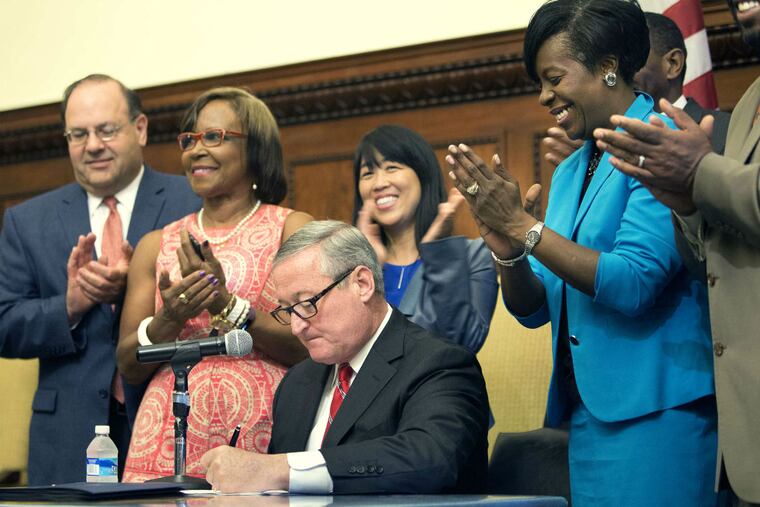Mayor’s office: Beverage tax did not come from Local 98, Johnny Doc | Opinion
The beverage tax proposal was driven by the Mayor’s 2015 campaign promise to expand access to free, quality pre-K to more Philadelphians and to create Community Schools.

Quality pre-K for over 5,000 kids annually, 20 Community Schools, hundreds of millions of dollars to rebuild Philadelphia’s aging parks, recreation centers, and libraries: Those are the reasons the Kenney administration proposed and implemented the beverage tax.
It was driven by need — specifically, the overwhelming needs of tens of thousands of residents — one quarter of the city’s population who struggle in poverty.
Some people are asking whether the federal indictments announced this week cast doubt on the genesis of the tax. The beverage industry, which has devoted millions of dollars to a failed legal challenge and public relations effort to fight the beverage tax, will no doubt seize on this purported linkage to the federal probe.
So we write to make the record absolutely clear: The mayor didn’t get the idea to implement the tax from Local 98 business manager John Dougherty. Neither did we. In fact, we and the mayor had no knowledge of Mr. Dougherty’s alleged effort to support the beverage tax to get retribution against the Teamsters until the indictment was announced Wednesday. To suggest otherwise sadly discounts the efforts of the many city employees, community organizations, and city residents who made the tax and the programs it funds possible.
The beverage-tax proposal was driven by the mayor’s 2015 campaign promise to expand access to free, quality pre-K to more Philadelphians and to create Community Schools. Then, Mike DiBerardinis — who was being considered for the job of managing director — pitched the idea of Rebuild to bring a new, innovative approach to meet the persistent capital needs of our parks, recreation centers, and libraries. In other words, the tax was the result of creative thinking around improving education for our children and economic development in our neighborhoods.
When we discussed these programs, we couldn’t just “find the money in the budget.” The city had made drastic cuts to programs and services during the recession, and the funds simply didn’t exist. We needed to pay for these programs from a new revenue source. In this process, we reviewed multiple options to raise new revenues, but we decided to pursue the beverage tax because it provided the necessary revenues, it would not negatively impact other revenue sources needed to fund the School District of Philadelphia or other city services, and the reduced consumption of sweetened beverages has other health benefits that benefit Philadelphia.
At first, the mayor was skeptical we would be successful in passing this new tax. Similar tax proposals had failed in the prior administration. But after discussing the costs and benefits of these programs, the mayor became convinced that this was the best and only way we could implement these programs and meet the needs of the residents of Philadelphia. The beverage tax became the centerpiece of his first budget proposal in March 2016, and we transmitted our legislation to City Council. Approval came three months later, by a 13-4 vote, after hundreds of courageous supporters — many of them parents of preschoolers — successfully advocated for the tax with their Council members.
Yes, this was the genesis of the Philadelphia beverage tax: identifying the needs — poverty, an inadequate education system, and struggling neighborhoods — and then solutions — PHLpreK, Community Schools, Rebuild — and then seeking a new funding mechanism that was the least onerous to taxpayers. We chose to tax the distribution of sweetened beverages because it is not a tax on consumers, and businesses can choose to absorb the costs in running their business.
So we urge Philadelphians not to be swayed by the industry’s rhetoric. The industry attacks the tax at every turn, spending tens of millions of dollars to lobby legislators, and convince residents, that its profits are more important than the needs of Philadelphia’s residents, specifically our kids. Don’t fall for that same trick again.
The beverage tax has already made a substantial impact: to date, 4,000 3- and 4-year-old children gaining access high-quality early education, 12 Community Schools serving 6,500 students, and the first of three borrowings for Rebuild. That is the current progress, and those benefits will only grow in the years to come. We believe it will be tragic if billionaires are allowed to tarnish the true origin of the beverage tax and an already impressive legacy.
Rob Dubow is finance director of Philadelphia. Jim Engler is chief of staff to Mayor Jim Kenney.